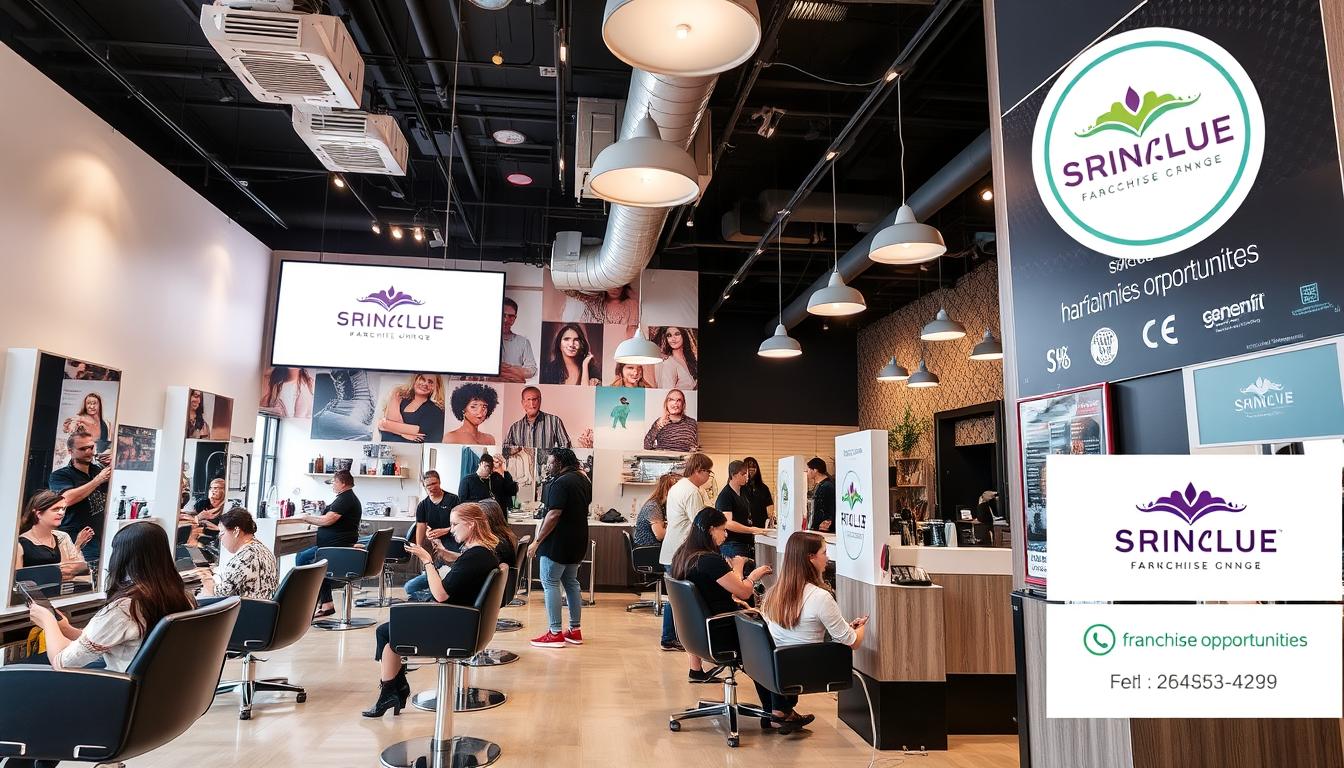Have you ever thought about why so many people start salon franchises? The beauty industry is booming, expected to hit $131 billion by 2026. The hair salon market alone was worth $155.6 billion in 2022. This makes salon franchises a tempting choice for business owners.
Starting a salon franchise lets you join a booming market. You get the perks of well-known brands, tested business plans, and support to help you succeed. With salon services in high demand, you can ride the wave of growth. Partnering with brands like Great Clips or Fantastic Sams gives you a competitive edge.
Key Takeaways
- The beauty industry is on a growth trajectory, projected to reach $131 billion globally by 2026.
- The U.S. hair salon market was valued at approximately $155.6 billion in 2022.
- Starting a salon franchise comes with the advantage of established brand support and business models.
- Entrepreneurs can benefit from the growing demand for salon services, which is projected to grow by 8% by 2030.
- Franchising with recognized brands can enhance market presence and customer trust.
Overview of Salon Franchising
Starting a salon franchise is a thrilling chance for entrepreneurs to dive into a booming market. This model lets individuals run their salons under a well-known brand. They pay a fee to use the brand’s name and practices, boosting their success chances in the beauty world.
What is a Salon Franchise?
A salon franchise offers a way for owners to use a tested business plan. It helps build brand loyalty, as people often choose what they know. Franchisees get training, marketing help, and clear rules from the franchisor, making it easier to succeed.
Benefits of a Salon Franchise
Salon franchising comes with many perks. Owners see more money from brand recognition and can grow their business. With the U.S. beauty market expected to reach $100 billion by 2024, now is a great time to start.
Franchisees get detailed training, ongoing support, and a solid system to follow. This makes them ready to do well in the industry. If you’re thinking about starting a salon, check out the opportunities in salon franchising as a lucrative option.
Types of Salon Franchises
Salon franchises offer a wide range of services to meet different customer needs. Knowing the types of salon franchises helps those looking to invest make better choices. The main categories are hair salons, nail salons, and spa franchises.
Hair Salons
The hair salon franchise market is huge, worth over $46 billion a year. They provide haircuts, styling, and coloring. This sector grows about 2-3% annually, making it a promising area for growth.
Starting a hair salon franchise costs between $200K and $400K. Most can break even in 3 to 5 years. Brands like Drybar have shown great success, making hair salons a good choice.
Nail Salons
Nail salon franchises focus on manicures, pedicures, and nail art. The demand for these services keeps growing, attracting many customers. They use creative marketing and unique services to keep customers coming back.
These salons are a great way to enter the booming beauty industry. They offer a chance to stand out with excellent branding and service.
Spa Franchises
Spa franchises offer massages, skincare, and other treatments for wellness. The spa market is booming as people look for ways to improve their health and beauty. These franchises provide a wide range of services, making them a unique investment.
Popular Salon Franchise Brands
In the world of salon franchises, some brands really stand out. They have a strong reputation and a big presence in the market. These brands offer great opportunities for those who want to start their own business.
Great Clips
Great Clips is well-known in the U.S. It’s famous for being easy to use, even for people who are always on the go. You can just walk in or book online, making it super convenient.
Even though it’s grown a bit slower in recent years, Great Clips is a big player in the hair salon market. This market is worth over $46 billion every year.
Fantastic Sams
Fantastic Sams is the oldest full-service salon franchise in the U.S. It’s known for quality services at good prices. The company focuses on making sure customers are happy, which makes it a great choice for starting a salon business.
With a wide range of services, Fantastic Sams attracts many customers. This makes it a smart investment in a market that makes over $57 billion every year.
Sport Clips
Sport Clips targets men’s grooming in a sports-themed setting. This unique approach has built a loyal customer base. It has seen steady growth, even if it’s not as fast as some other brands.
Despite slower growth, Sport Clips shows there’s room to grow in the male grooming market. It’s a great example of how a specialized salon can thrive.
Costs Involved in Salon Franchises
Understanding the costs of salon franchises is key for investors. The initial investment can be between $200,000 to $400,000. This depends on the franchise type and location. It’s important to look at all financial aspects when investing in a salon franchise.
Initial Investment
The initial cost includes the franchise fee, which varies by brand. For example, My Salon Suite’s fee is $50,000. Start-up costs can go from $984,999 to $1,577,236, depending on build-out and equipment. You’ll need to lease or buy a space, buy equipment, and stock hair products.
Ongoing Royalties
Ongoing fees are a big part of franchise costs. These fees are a percentage of sales, usually 5.5% to 8%. My Salon Suite charges 5.5% plus a 2% marketing fee. It’s important to manage these costs to stay profitable.
Estimated Start-Up Costs
Start-up costs include rent, advertising, and employee wages. Build-out costs for My Salon Suite can be $611,020 to $931,088. Salon suite franchises have lower marketing costs because stylists handle their own marketing.
Key Factors to Consider
Investing in a salon franchise requires careful thought. You need to consider several key elements for success. Knowing these factors is vital for anyone thinking about becoming a franchisee.
Location
The right location is essential. It affects how many people see your salon and how easy it is to get there. To choose well, you must research the market and understand who lives nearby.
Knowing what your competitors are doing and what your customers want is also important. This helps you pick the best spot for your salon.
Brand Reputation
A good brand reputation is key. It attracts both beauty professionals and customers. Brands with a strong reputation often have a loyal customer base.
This makes it easier for new franchisees to succeed. A strong brand builds trust and credibility with customers.
Support and Training
The support and training you get from the franchisor are critical. Good training programs teach you how to manage your salon and market it. They also help you stay competitive.
Franchisors that offer ongoing support help their franchisees do well. They ensure you can keep up with changes in the market.
Legal Aspects of Franchising
Understanding franchising laws is key for those thinking about starting a salon franchise. Laws protect both sides and set clear rules. The franchise disclosure document is a critical tool in this process. It gives insights into the business model, financials, and what the franchisor expects.
Franchise Disclosure Document (FDD)
The franchise disclosure document is a detailed report needed by law in many places. It includes important info like fees and royalties. It helps future franchisees understand the financial and operational aspects of joining a franchise.
Franchise Agreements
A franchise agreement is a contract that outlines what both sides must do. These agreements usually last about seven years and may have renewal options. They cover things like territory, non-compete clauses, and who owns the brand.
About 75% of salon franchise agreements have non-compete clauses. These can last for two years. They help keep the franchise unique and consistent.

Marketing Strategies for Salon Franchises
In a competitive market, the right marketing strategies for salon franchises can enhance visibility and attract clientele. Success relies heavily on integrating both online marketing for salons and community-focused approaches. This combination helps salons to reach a broader audience while also maintaining strong local ties.
Online Marketing
Utilizing digital channels is essential for modern salons. A well-crafted online presence boosts brand visibility significantly. Engaging in social media marketing allows salons to connect with customers, showing services and promotions.
Email campaigns keep clients informed about special offers and new services. This improves customer retention. SEO techniques in website content help salons rank better in search results. This increase in visibility directly correlates with customer traffic.
Local Promotions
Implementing local promotions strengthens community ties and elevates brand awareness. Participating in local events or sponsoring community activities can improve a salon’s reputation within its region. The effectiveness of these efforts enhances local SEO, making it easier for nearby customers to discover the salon.
Collaborating with other local businesses for joint promotions can introduce the salon to new clientele bases. A thorough approach to local marketing can drive significant customer traffic and foster long-lasting relationships.
Financing Your Salon Franchise
Getting the money you need is key for anyone wanting to own a salon franchise. There are many ways to get the funds you need. Knowing the difference between bank loans and other options can help you reach your business goals.
Traditional Loans
Bank loans are a common choice for financing your salon franchise. Banks or credit unions often offer a lot of money with good terms. They usually check your credit score, needing a score of 610 to 640 for salon loans.
Many business owners choose Small Business Administration (SBA) loans. These loans have flexible payments and can help you get the money you need to start your salon.
Alternative Financing Options
There are other ways to get money too. You can use your own savings to fund your salon, a method called bootstrapping. A business line of credit works like a credit card, letting you borrow money as you need it.
Crowdfunding sites like GoFundMe and Kiva can also help you raise money. But, you’ll need to work hard to promote your campaign. Grants for small beauty businesses are out there, but getting them is tough because of the competition.

Using tools like bVerify can make getting financing easier. It helps with important steps in the process and builds trust in the franchise. With ongoing help, you can deal with the loan process better and own your salon franchise sooner.
Success Stories in Salon Franchising
Many people have found success in salon franchising. Stories from different franchises show how important strategy and market knowledge are. Erin Elgin, for example, started with Sola Salons, seeking growth and freedom. Her story teaches us to choose a franchise that fits our goals and offers good support.
Case Studies
Erin Elgin’s journey in beauty is a great lesson. She chose Sola Salons because they understood beauty pros’ needs. This partnership gave her access to top tech and marketing.
Being adaptable and connecting with the community were key to her success. Franchises in the U.S. show this is possible, with 805,500 locations making $860 billion.
Lessons Learned
Franchising teaches us to face challenges and focus on customers. Elgin’s story shows the value of being friendly and smart in hiring. She balanced work and life, trusting her gut.
Her success shows the importance of doing well and being part of the community. These lessons help us understand how to succeed in salon franchising.
Challenges in Salon Franchising
Franchise owners in the salon industry face many challenges. They must deal with tough competition and manage their employees well. These issues can greatly affect their business.
Competition
The salon industry is very competitive. Many brands are fighting for customers. To succeed, owners need to know their local market well and offer something unique.
They must build a strong brand, use smart marketing, and keep up with what customers want. If they fail, they could lose money and visibility.
Employee Management
Managing staff is a big challenge. Issues like hiring, training, and keeping employees happy are key. If staff leaves often, it can upset customers and hurt the business.
To keep a good team, owners should create a fun work place, pay well, and help employees grow. This helps keep employees happy and skilled.
Future Trends in the Salon Franchise Industry
The salon franchise industry is changing fast. It’s adapting to new consumer wants and tech advancements. Technology is key for running a business now. Salon software, online booking, and easy payments make things smoother.
Studies show businesses with online booking make more money. They get 76% of their appointments online. Also, 63% of people worldwide want automation in salons, showing a big need for tech solutions.
Technology Integration
Technology is changing salons a lot. Salons use data to understand what customers want. For example, 90% of people want reminders about their appointments, often by text.
Hybrid salons are becoming popular. They’re not just for haircuts but also for other activities. This means salons can offer more and connect with customers in new ways.
Sustainability Practices
Sustainability is also big in salons now. More people want eco-friendly products and services. Brands that focus on this will stand out.
Gen Zers, in particular, want more than just haircuts. They’re interested in classes and DIY boxes. Salons need to be innovative and green to keep up. This way, they can build loyalty and attract customers who care about the planet.





